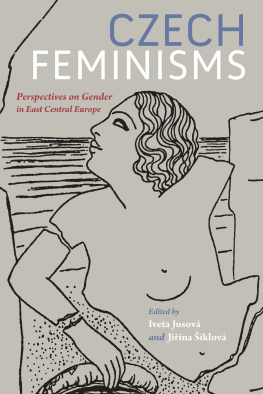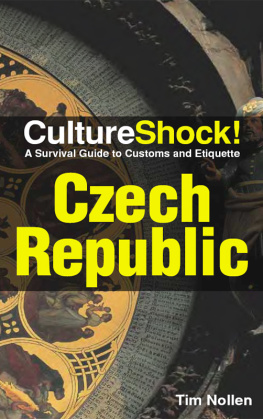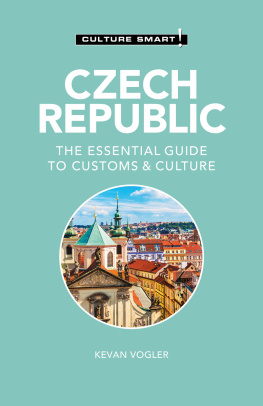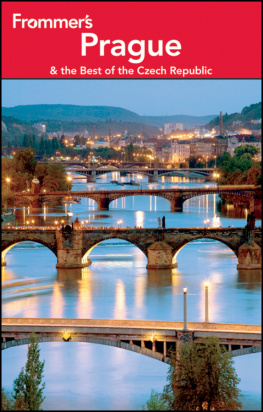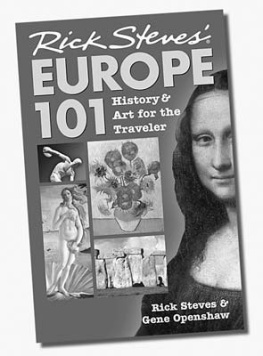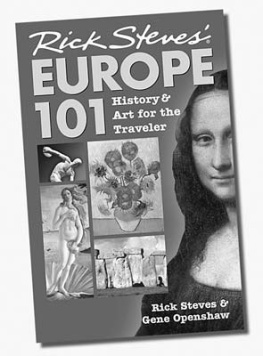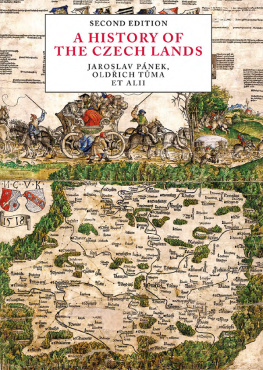
CZECH FEMINISMS
CZECH FEMINISMS
Perspectives on Gender in East Central Europe
Edited by
Iveta Jusov and Jiina iklov
Indiana University Press
Bloomington and Indianapolis
This book is a publication of
INDIANA UNIVERSITY PRESS
Office of Scholarly Publishing
Herman B Wells Library 350
1320 East 10th Street
Bloomington, Indiana 47405 USA
iupress.indiana.edu
2016 by Indiana University Press
All rights reserved
No part of this book may be reproduced or utilized in any form or by any means, electronic or mechanical, including photocopying and recording, or by any information storage and retrieval system, without permission in writing from the publisher. The Association of American University Presses Resolution on Permissions constitutes the only exception to this prohibition.
The paper used in this publication meets the minimum requirements of the American National Standard for Information SciencesPermanence of Paper for Printed Library Materials, ANSI Z39.481992.
Manufactured in the United States of America
Library of Congress Cataloging-in-Publication Data
Names: Jusov, Iveta, [date] editor. | iklov, Jiina, [date] editor.
Title: Czech feminisms : perspectives on gender in East Central Europe / edited by Iveta Jusova and Jiina iklov.
Description: Bloomington : Indiana University Press, [2016] | Includes bibliographical references and index.
Identifiers: LCCN 2016011654| ISBN 9780253021892 (cloth : alk. paper) | ISBN 9780253021915 (pbk. : alk. paper) | ISBN 9780253021939 (ebook)
Subjects: LCSH: FeminismCzech Republic. | WomenCzech Republic. | Sex roleCzech Republic.
Classification: LCC HQ1610.3 .C94 2016 | DDC 305.42094371dc23
LC record available at https://LCCN.loc.gov/2016011654
1 2 3 4 5 21 20 19 18 17 16
This book is dedicated to all those
who have come before us.
CONTENTS
Iveta Jusov
Iveta Jusov
Jitka Malekov
Karla Huebner
Alena Wagnerov
Pavla Frdlov
Simona Fojtov
Hana Hakov and Zuzana Uhde
Linda Sokaov
Karolna Ryvolov
Mria Strakov
Simona Fojtov
Kateina Nedblkov
Iva mdov
Jiina iklov
Zuzana tefkov
Jana Valdrov
ACKNOWLEDGMENTS
T HE AUTHORS WOULD like to thank Indiana University Press, and especially Raina Polivka, the music, film, and humanities editor, and Darja Malcolm-Clarke, the project editor and manager, for believing in this project and helping us bring this work from an enthusiastic proposal to a thoughtfully considered book. We were fortunate to benefit from the close reading and attentive work of the copyeditor Margaret Hogan. And Janice Frisch has been of great help with copyright-related questions.
We would also like to express our appreciation to the two anonymous external readers whose feedback on the earlier version of the manuscript helped sharpen our focus and led to a number of improvements with both structure and individual pieces.
Finally, we are grateful to Ivetas partner, Dr. Dan Reyes, who took time away from teaching philosophy to his students and from his own writing projects to read through and comment on several drafts of the manuscript. His feedback and suggestions significantly improved both the content and language fluency of the present book. As well, we are grateful for Dans help with translation of several of the chapters originally prepared in Czech.
CZECH FEMINISMS
INTRODUCTION |
Gender, Sexuality, and Ethnicity Issues in the Czech Culture: Past and Present |
IVETA JUSOV |
I T WAS IN the late 1980s, while studying British and Czech literatures at Palack University in Olomouc, Czechoslovakia, that I first became aware of feminism and decided to focus my undergraduate thesis on U.S. and British feminist theory. The country was still a socialist state, and feminism was decidedly not considered an appropriate subject of study, nor were there any resources readily available on this topic. But I was in luck. Unbeknownst to me at the time, the Iron Curtain was about to come apart. Through the revolutionary months of 1989, I became acquainted with one of the few scholar-activists in the country who could understand my hunger for anything feminist and could help me with my research: Jiina iklov, the coeditor of this volume. I wrote my thesis in 1990 using the books available at the Gender Studies Library set up in Jiinas famous apartment-turnedGender Studies Centre in Prague, likely one of that facilitys first beneficiaries. Traveling between Olomouc and Prague to visit the library and center, it did not take me long to develop admiration for the energetic iklov.
The early 1990s were times of heated feminist exchanges and public discussions about feminism, and iklovs role in making these debates both compelling and possible cannot be overstated. In the context of many prominent male Czech migrs returning from the West, all nearly uniformly having only derogatory things to say about feminist ideologues, iklov drew on the considerable respect that she wielded with the Czech public (as a dissident and Charta 77 signatoryand others, developed a consistent critique of Western-style feminism. In the essays they published throughout the 1990s, iklov and Havelkov stressed the need to study Czech womens issues in their specific historical, political, and social contexts (Havelkov 1993, 64; iklov 1993, 80).
Two decades later, in a so-called unified Europe, with the Czech Republic (CR) by and large a proud participant in the European Unions first wave of eastward expansion, iklovs call for accentuating the situatedness of our discussions of womens issues continues to be pertinent. This attention to our specificities, differences, and similarities also strongly informs my own ongoing work directing Carleton Colleges Womens and Gender Studies in Europe semester-long study-abroad program. Guiding U.S. college students in the study of European (including Czech) gender, sexuality, and ethnicity issues, I note every year that students knowledge brought to the cultural sites, histories, and traditions of Eastern Europe tends to be surprisingly limited. My experience confirms the continued (and perhaps even increasing) relevance of Jennifer Suchlands 2011 assessment of the persistent exclusion of attention paid to the diversity that is the former second world within U.S. Womens Studies (but also perhaps U.S. education in general), in spite of overall efforts to internationalize knowledge production (838). As Suchland has articulated, while intellectual pathways to certain locations in the world have been instituted within U.S. Womens Studies, there continues to be a lack of focus on the second world in transnational feminism (837).
The peculiar indistinction of the former Eastern European bloc as a supposed non-region (as it was proclaimed to be in 1995 by Wanda Nowicka at the World Conference on Women in Beijing) has in some respects been addressed and, one might imagine, remedied. The annual peer-reviewed journal Aspasia, dedicated to womens history in Central, Eastern, and Southeastern Europe (CESEE), has been appearing since 2007, offering informative discussions on a plethora of topics relevant to local scholars. The fairly steady stream of monographs and edited volumes devoted to gender (less so ethnicity or class) issues in the region might perhaps even speak to a gradual establishment of a sub-discipline of Eastern European Womens/Gender Studies within the broader field of Womens and Gender Studies (WGS). Relevant articles dealing with the region also occasionally appear in established WGS journals, including the
Next page
